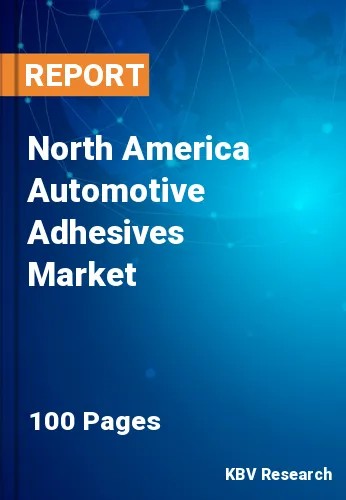The North America Automotive Adhesives Market would witness market growth of 4.5% CAGR during the forecast period (2021-2027).
Automotive adhesives are used in a variety of applications, including body in white, glazing, powertrain, paint shop, and upholstery. The usage of automotive adhesives for BIW is fairly common. This can be linked to the shift away from traditional welding and toward automobile adhesives, which has the added benefit of reducing structural fatigue.
Powertrain and upholstery end uses are expected to increase at a faster rate in the automobile adhesive market in the future years. Furthermore, the automotive adhesive market is likely to benefit from rising luxury automobile adoption, need for cosmetic upgrades and passenger comfort, as well as value additions such as interior sound reduction features.
Pressure sensitive adhesives (PSA) that can be applied quickly are being developed by companies in the automobile adhesive sector. Since the former contributes in vehicle weight reduction, these adhesives are emerging as a potential alternative to standard mechanical fasteners. PSAs are widely distributed to encourage people to use adhesives to distribute stress more equally. As mechanical fasteners wreak havoc on plastics, firms in the automotive adhesive sector are ramping up manufacturing of PSAs. As a result of the uniform stress distribution, thinner materials can be used, resulting in weight savings and fuel savings.
The market demand for automotive adhesives in Mexico is likely to rise as the automobile industry expands. According to OICA 2019, Mexico's total vehicle production was 3.98 million units, comprising 2.6 million commercial vehicles and 1.38 million passenger automobiles. The Mexican automotive sector has benefited from its growing population, improved lifestyle, and closeness to the United States. This expansion is predicted to feed demand for automotive electronic parts and assemblies in Mexico, which would likely increase demand for automotive adhesives. According to the National Institute of Statistics and Geography (Inegi), Mexican auto exports, principally to the United States, totaled 2,681,806 cars in 2020, down 20.85% from the previous year. As a result, Mexico has risen to fourth place among the world's major vehicle exporters.
The US market dominated the North America Automotive Adhesives Market by Country in 2020, and would continue to be a dominant market till 2027; thereby, achieving a market value of $1,229.9 million by 2027. The Canada market is experiencing a CAGR of 6.8% during (2021 - 2027). Additionally, The Mexico market would display a CAGR of 5.9% during (2021 - 2027).
Based on Resin Type, the market is segmented into Polyamide, Polyurethane, Silyl Modified Polymers (SMP), Silicone, Epoxy, Acrylics, and Others. Based on Technology, the market is segmented into Water Based, Pressure Sensitive, Solvent Based, Hot Melt, and Others. Based on Vehicle Type, the market is segmented into Passenger Vehicle, Light Commercial Vehicle, and Heavy Commercial Vehicle. Based on Vehicle Type Application, the market is segmented into Body-in-White (BIW), Powertrain, Paint Shop, and Assembly. Based on countries, the market is segmented into U.S., Mexico, Canada, and Rest of North America.
Free Valuable Insights: The Global Automotive Adhesives Market is Estimated to reach $6.3 Billion by 2027, at a CAGR of 4.9%
The market research report covers the analysis of key stake holders of the market. Key companies profiled in the report include Sika AG, Henkel AG & Company, KGaA, 3M Company, DuPont de Nemours, Inc., Huntsman Corporation, Dymax Corporation, Arkema S.A., PPG Industries, Inc., H.B. Fuller Company, and Illinois Tool Works, Inc.
By Resin Type
By Technology
By Vehicle Type
By Application
By Country
Our team of dedicated experts can provide you with attractive expansion opportunities for your business.

